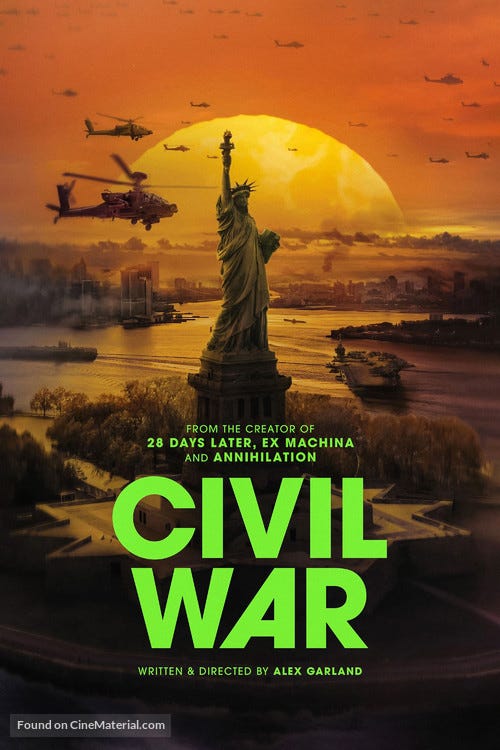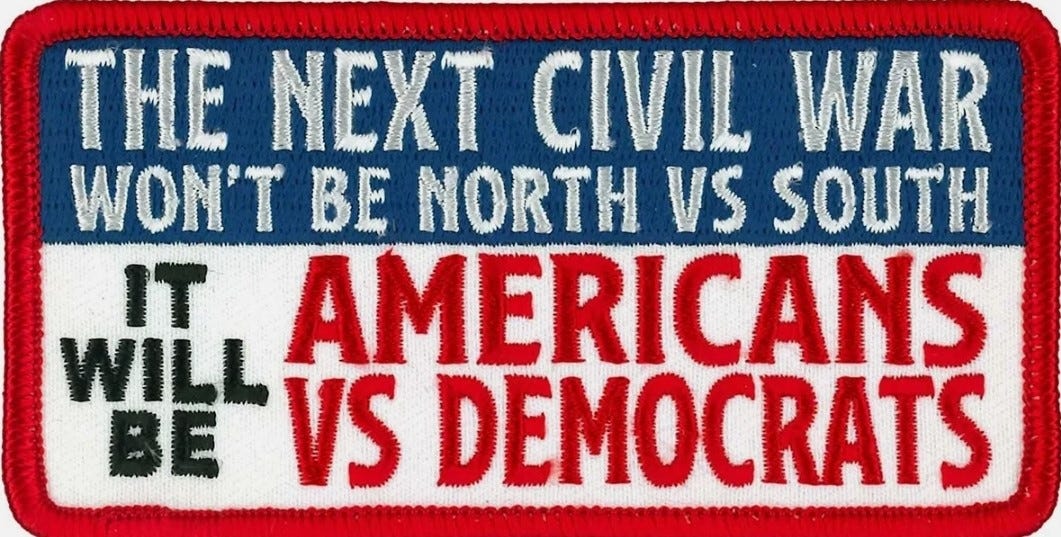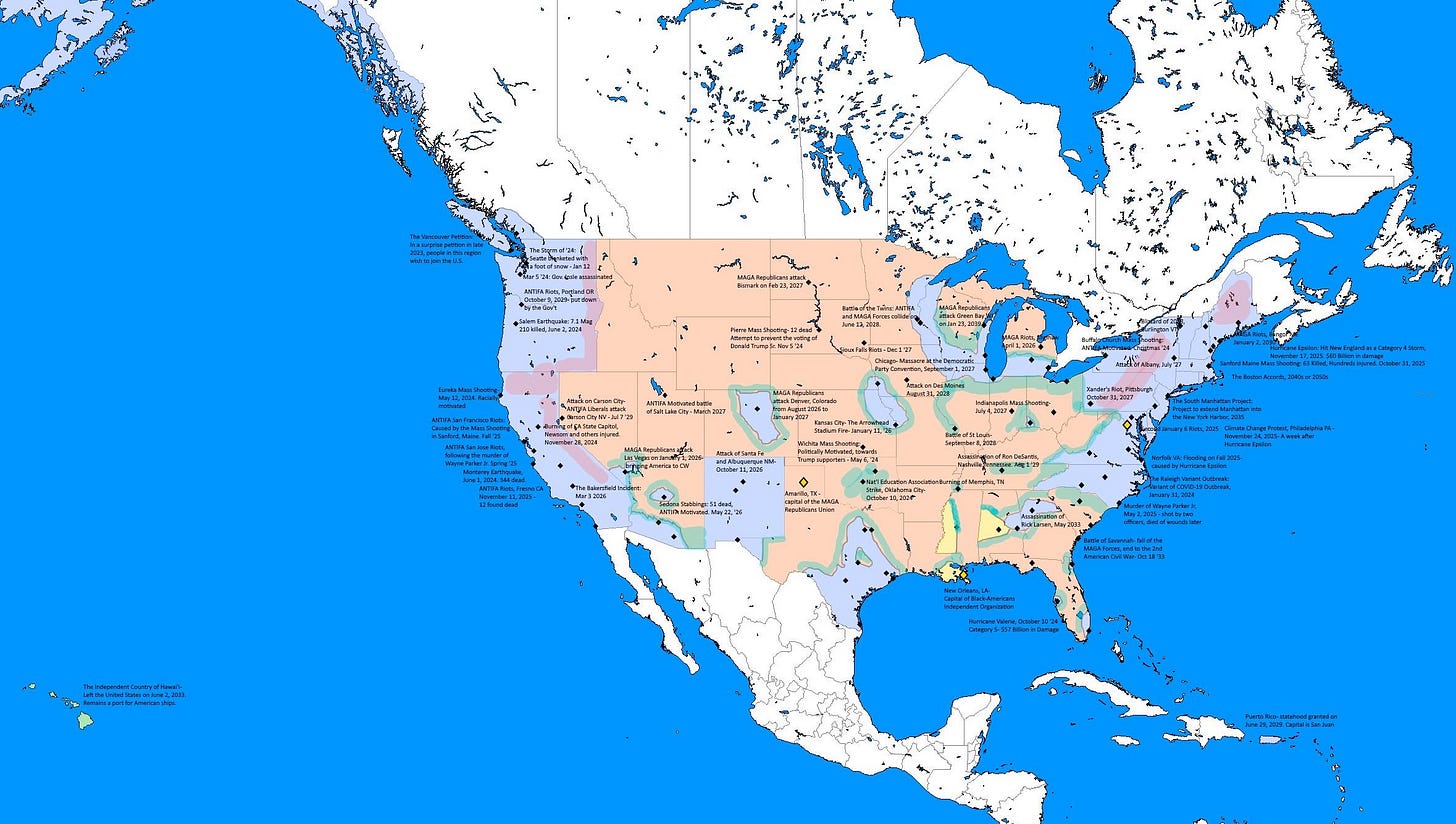Is America Headed for Civil War?
CIVIL WAR CHRONICLES - The source for analysis, insights and information on America's next civil war, and how to prevent it.
"You need to have weapons to take on the government, you need F-15s and maybe some nuclear weapons…" JOE BIDEN, July 2021.
Well, in response to Biden, some state Air National Guards have F-15s and may side with rebel states. And would the federal government nuke Americans in a civil conflict?
It’s not nearly that simple.
CIVIL WAR 2.0 – ANALYSIS – Welcome to my new occasional series on the potential for civil conflict in America, how it might come about and how we can best avoid it.
This is a very serious topic I have been following and discussing for a few years now.
And it just doesn't go away. In my view, the upcoming 2024 election will only increase the danger, regardless of who wins.
With America increasingly polarized along cultural, political, sometimes racial, and ideological lines, the blue federal government increasingly clashing with various red states, and the political rhetoric at uber-heated levels, the chances for civil war or other major political violence appear extremely high.
Witness the recent deadly assassination attempt in Pennsylvania against former President Donald Trump.
Much has been written on this danger, and Hollywood even broached the controversial issue in its recent movie “Civil War.”
My experience in civil conflicts overseas, including the Balkans, my family's experience living through a violent revolution/civil war in Cuba, and my academic, political-military and intelligence background, have all given me a unique perspective on this highly fraught topic.
Some believe a civil war is all hype. Others note that it is more likely than not. Clearly, I'm in the latter camp.
A few of my pieces in this series might be more academic, others will be more political, even partisan. And yet others will be military-focused or purely speculative.
In the first category noted above, Foreign Policy (FP), a prestigious policy journal, recently held a video panel on the danger titled: “The United States is now showing preconditions for political violence. Here's how it can prevent disaster.”
The discussion includes Barbara F. Walter, author of the 2022 New York Times bestseller “How Civil Wars Start.” Walter has closely studied the genesis of civil wars around the world.
FP's Editor in chief Ravi Agrawal manages the discussion.
Unfortunately, that video is available only to subscribers. But, in its written introduction to the video, FP notes:
Whenever the United States encounters a tragedy, politicians and commentators find themselves reaching for a lazy platitude: “This is not America.” In other words, bad things don't happen here—they happen there.
If it does happen here, this is how our country breaks down politically and ideologically.
Barbara F. Walter wants Americans to know awful things can happen in the United States, too. After a career examining conflicts across the Middle East, Africa, and South Asia, the University of California, San Diego professor has studied the underlying factors that contribute to political violence—and even civil war.
Her finding is that the United States now ticks off many of the boxes of preconditions for public violence.
“Postelection violence in democracies tends to happen under a specific set of conditions: winner-takes-all democracies with strong presidents where the population is divided, whether ethnically, religiously, or racially. And elections are contested, so at least one of the sides believes that the elections weren't entirely free and fair. … The United States has all of those characteristics,” Walter said, speaking on FP Live.
The good news is that, just like the preconditions for a human disease, better outcomes can be found. “The single best long-term solution is to reform and improve America's democracy.”
Some video excerpts are also available here.
This is one prominent view:
Another might be Americans vs ‘MAGA extremists.’
Meanwhile, what are some areas the two experts above discuss?
According to FP, Walter, who also participated in a CIA task force on political instability, “explains the two factors that are predictive of political instability and violence: anocracy (or partial democracy) and identity-based parties.”
FP adds that: “The conditions that foment conflict are often predictable, she says—and there are signs that those conditions are growing increasingly visible in the United States.”
Agrawal asks: “What does a 21st-century civil war look like?”
He then “explains that naysayers are often imagining a 19th-century battlefield, instead of the terrorism, insurgencies, and guerrilla warfare that characterize modern political violence.”
This is something that the movie “Civil War” tried to highlight. Violent militias and factions often take hold in some areas when authority collapses, even as major military forces fight elsewhere in the country.
In this FP discussion, Walter offers solutions to stave off civil war in the United States: “strengthen and reform democratic institutions and have political parties reach across racial, ethnic, and religious lines.”
As always, the solutions are always easier said than done.
Stay tuned for much more on the dangers of an American Civil War 2.0 as my series ramps up and continues.
Paul Crespo is the President of the Center for American Defense Studies, Managing Editor of American Liberty Defense News, and Managing Partner of SPECTRE Global Risk. As a Marine Corps officer, he led Marines, served aboard ships in the Pacific and jumped from helicopters and airplanes.
He was also a military attaché with the Defense Intelligence Agency (DIA) at U.S. embassies worldwide.
He later ran for congress, taught political science, wrote for a major newspaper and had his own radio show. A graduate of Georgetown, London and Cambridge universities, he brings decades of experience and insight to the issues that most threaten our American liberty – at home and abroad.












Joe also has said the undocumented immigrants who’ve answered his invitation to come into the US are a “gift” to the nation.